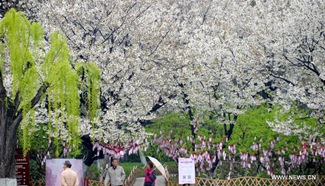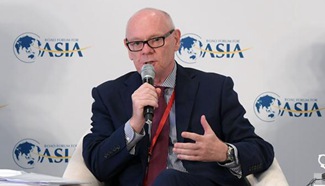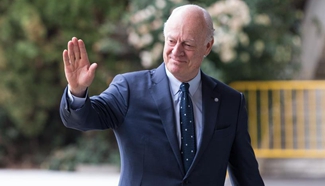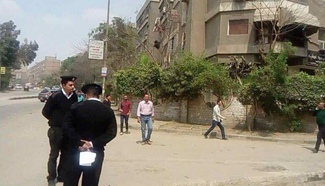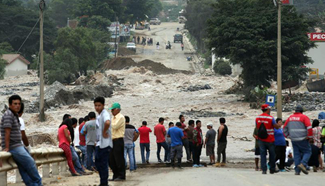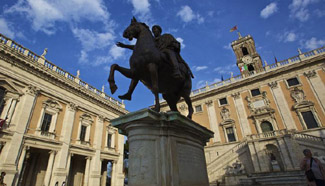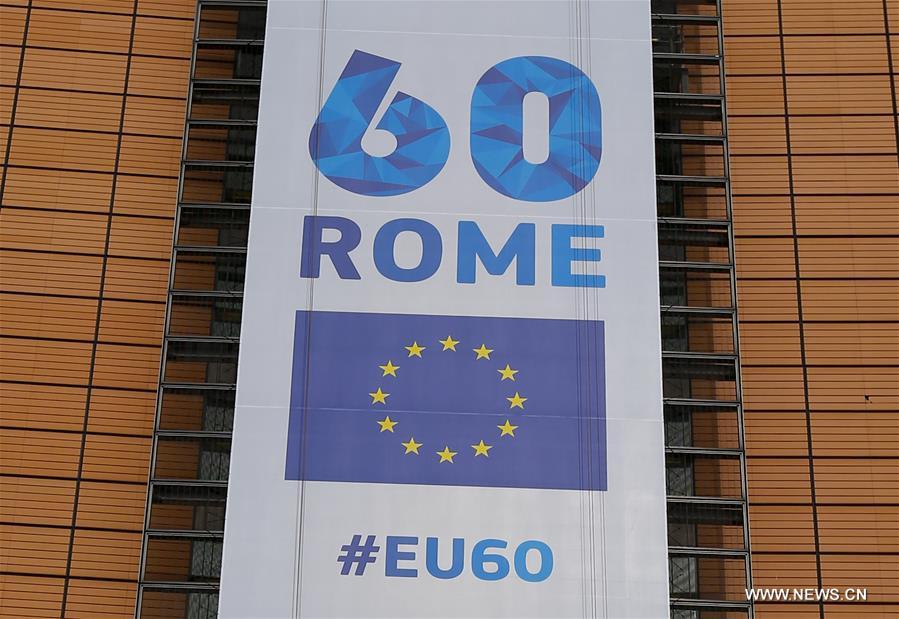
Photo taken on March 24, 2017 shows a banner celebrating the 60th anniversary of Treaty of Rome is displayed on European Commission building in Brussels, Belgium, March 24, 2017. The EU-27 leaders will meet in Rome on Saturday to celebrate the 60th anniversary of signing of the treaty and discuss about the future of the bloc without Britain. (Xinhua/Ye Pingfan)
by Shuai Rong, Jeremy Hawkins
BRUSSELS, March 24 (Xinhua) -- European Union (EU) leaders will gather in Rome on Saturday for a special summit to celebrate the 60th anniversary of the signing of the Treaty of Rome, which launched the EU's predecessor, he European Economic Community (EEC).
Even as the bloc reflects on achievements and shared values, European Commission President Jean-Claude Juncker earlier said: "Rome must also be the start of a new chapter. There are important challenges ahead of us. A united Europe with 27 member states needs to shape its own destiny and carve out a vision for its own future."
The high-profile celebrations of the anniversary of the signing of the 60th anniversary of the Treaty of Rome serve three purposes: to review achievements, to face current challenges, and also to look to the future.
RECALLING ACHIEVEMENTS
Since the 1957 signing of the Treaty of Rome, the EEC and, later, the EU have become models for regional integration, including remarkable achievements.
First and foremost, the international union brought an end to hundreds of years of ongoing war for the European continent, allowing Europeans to enjoy an unprecedented and lasting peace, with the EU even winning the Nobel Peace Prize in 2012.
In addition, the EU has become the world's largest single market, founded on the union's "four freedoms" -- movement of goods, capital, services and people -- a benchmark for integration as EU citizens freely travel across borders to work, study and travel.
The EU single currency, the euro has become second only to the dollar as the most widely used currency in the world. The union has also become a leader in technology, with 40 percent of technological breakthroughs happening in Europe.
In addition, Europe's soft diplomatic power has become an important part of international relations, contributing to the Iran nuclear agreement, the Paris climate agreement, and numerous other achievements reached with the EU's influence.
As the world's largest provider of developmental and humanitarian aid, the EU provided a total of 74 billion euros (79.94 billion U.S. dollars) in aid in 2015, or 56 percent of the world's total, 2.3 times that spent by the United States.
FACING CHALLENGES
Nevertheless, the EU is clearly aware of the unprecedented challenges it faces, with its global status gradually declining.
One year ago, the worst terror attacks in Belgium's history struck Brussels and capital of EU, killing 32 people and wounding more than 300 hundred. When Belgium is marking the first anniversary of the suicide bomb attacks on the Brussels airport and underground system, Britain was struck by terrorist attack which was its deadliest in London since 2005.
An EU report said more than 1,500 jihadists have returned to Europe with orders to "carry out attacks". Terror-related security issues are of ever-increasing concern to the continent.
Regarding economic challenges, from one perspective, the EU is gradually recovering from the world financial crisis. But while European economies are growing, the recovery is disproportionate between member states.
In addition, European youth continue to be harder hit than other segments of the population. While data shows that the overall EU unemployment rate is around 8 percent, the rate for people under the age of 25 is more than 17 percent.
In addition, the EU faces challenges related to rising populism, Brexit, the ongoing refugee crisis and terrorist threats are leading to a sense that Europe has come to a crossroads of history, with many observers skeptical about the bloc's prospects.
The EU also faces demographic challenges. In 1900, Europe's population accounted for 25 percent of the world. But by 2060, this proportion will have dropped to less than 5 percent, and no individual EU member state's population will exceed 1 percent of the world's population.
At the same time, Europe is gradually aging. By 2030, the average age of the European population will be 45 years, much higher the world average of 33, becoming the "oldest" region in the world.
On the other side of the Atlantic, the United States' "strategic contraction" and "isolationism" raised worries across Europe. U.S. President Donald Trump advocated trade protectionism which cast shadows on transatlantic trade relations.
The fact that the United States is dissatisfied with the reduction of European military spending also adds uncertainties to U.S.-EU relations.
OUTLOOK ON THE FUTURE
How to deal with these challenges? While the EU tries to find a way out, the Rome summit will be an opportunity to think about the future of Europe.
The EU white paper put forward five ideas for the future of European integration, including the controversial "multi-speed Europe" concept. Many analysts believe "multi-speed Europe" will become the future in terms of the EU's real choices.
"If EU countries are going to move forward, this will have to be at different speeds," said Shada Islam, policy director at the Friends of Europe think tank in Brussels. "This is inevitable because we are not all at the same level of development and we have different concerns."
The European Council of Foreign Relations in a recent study point out that a significant number of member states want more flexible cooperation within the EU, which would help to show the benefits of European collective action in overcoming policy impasses.
However, some members worry that EU institutions are overstaffed and that large members (especially Germany) would take up more resources to become dominant countries.
It is foreseeable that the "multi-speed Europe" scenario will be the focus of internal wrestling with the European Union for the immediate future.
The first official observation of this wrestling match will come in document form, with the signing of a declaration in Rome on Saturday by European officials, and which will be worthy of close attention.
A united, prosperous and stable EU is an important partner in promoting multilateralism and global development, and in facilitating better relations between member states and China.
Facing new challenges of protectionism, Jacques Pelkmans, a senior researcher at the Center for European Policy Studies, points out that China, as the world's second largest economy and the largest developing country, and the EU which is the largest developed economies, can further consider the possibility of establishing a free trade area to fight against trade protectionism.




